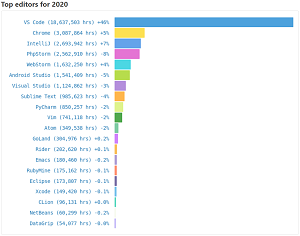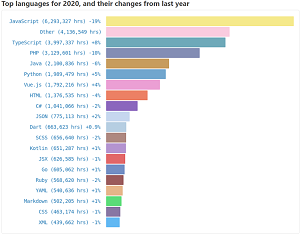News
Time Tracker Says VS Code Is No. 1 Editor for Devs, Some Working 15+ Hours Per Day
WakaTime, which does time tracking for programmers, released data for 2020 showing that Visual Studio Code is by far the top editor/IDE used by its coders, some of whom are hacking away for more than 15 hours per day.
The 7-year-old San Francisco company uses open source plug-ins that can be installed in text editors and IDEs -- including Visual Studio -- to measure coding activity, letting users see exactly how much time they spent on different tasks.
Those tasks, overwhelmingly, are conducted in VS Code, Microsoft's open source, cross-platform editor that acts more like a full-fledged IDE through the use of a huge ecosystem of extensions. Stats for 2020 show VS Code was used for 18,637,503 hours of programming, while the second-place editor, Chrome, notched only 3,087,864 hours.
 [Click on image for larger view.] Top Editors for 2020 (source: WakaTime).
[Click on image for larger view.] Top Editors for 2020 (source: WakaTime).
This reporter always thought of Chrome as a browser with built-in dev tools, but the remaining top-ranked editors are more traditional: IntelliJ (2.7M hours); PhpStorm (2.5M hours), WebStorm (1.6M hours); Android Studio (1.5M hours); Visual Studio (1.2M hours); Sublime Text (985,623 hours); PyCharm (850,257 hours); and Vim (741,118 hours).
The finding isn't surprising, as many other studies and surveys have long pointed to the popularity of VS Code. That popularity is growing among the 250,000-plus developers who use WakaTime. Last year's report showed VS Code at 12,052,975 hours, so the 2020 numbers represent a 46 percent increase -- which itself is by far the highest year-over-year percentage increase in usage (No. 2 is 7 percent for IntelliJ).
WakaTime also measured programming languages used, and once again its findings track closely with other reports, as the ubiquitous JavaScript tops the list at 6,293,327 hours, followed by Other (4.1M hours); TypeScript (4M hours); PHP (3.1M hours); and Java (2.1M hours).
 [Click on image for larger view.] Top Languages for 2020 (source: WakaTime).
[Click on image for larger view.] Top Languages for 2020 (source: WakaTime).
Other data shows the average user spent 51 minutes per day programming last year, but a programming time leaderboard shows some coders were reportedly at work for more than 15 hours per day. The company says "WakaTime’s open source plugins only track when you’re typing in your editor. Stop typing, and WakaTime stops tracking your stats."
Top OSes are also tracked, and here Mac leads the pack at 15,972,105 hours, followed by Windows (13,197,340 hours) and Linux (6,761,196 hours). However, the order differs when tracking the usage change from last year, as Windows usage grew 32 percent, Linux usage increased 17 percent and Mac fell 48 percent. Those are about the same percentage changes noted in the 2019 report.
WakaTime offers a free level of its service with basic functionality, along with higher for-pay levels. The 2020 blog post can be found here, while the 2019 counterpart is here. For the data techies out there, aggregated 2020 information is available as a JSON dump.
About the Author
David Ramel is an editor and writer for Converge360.